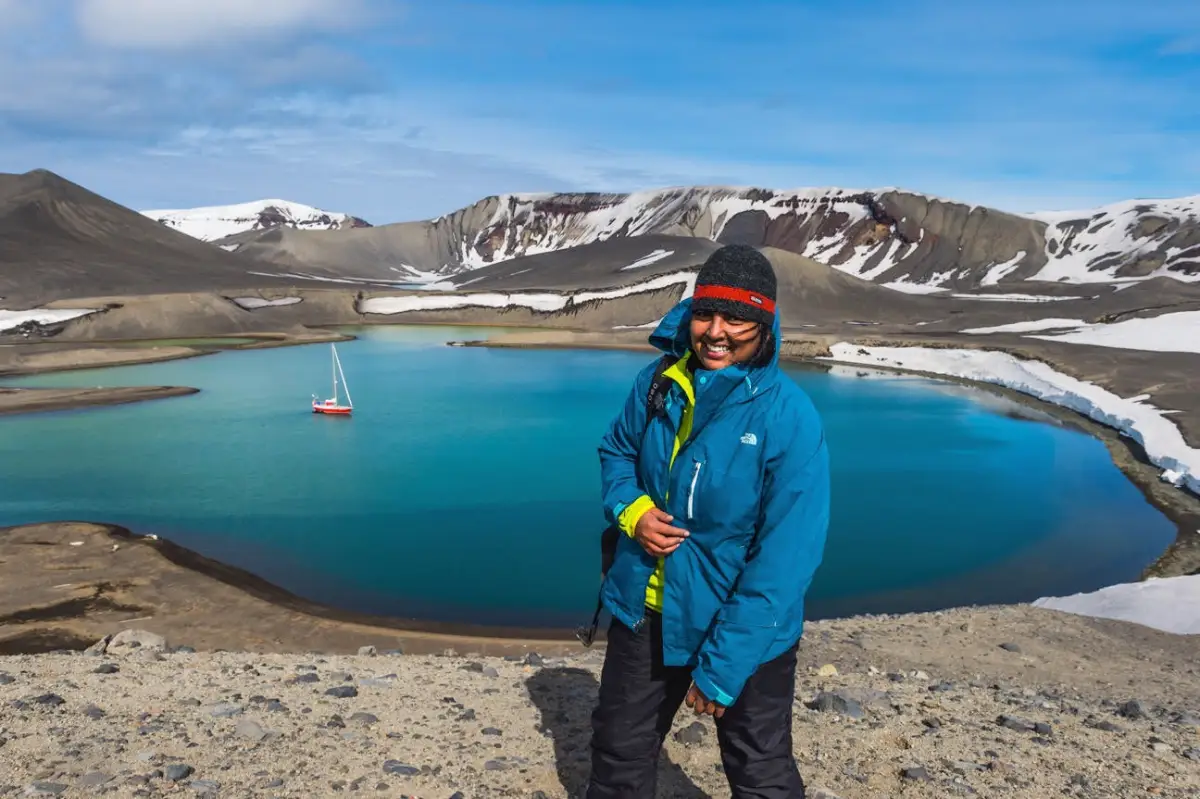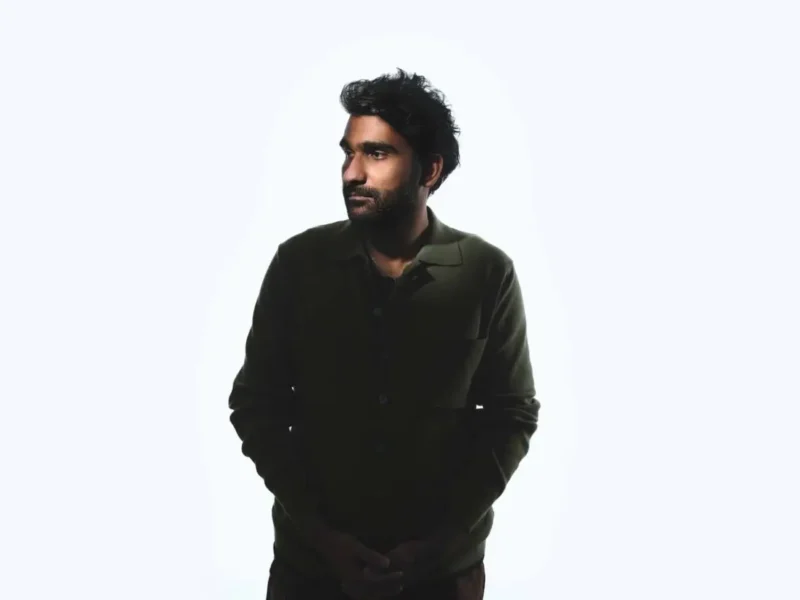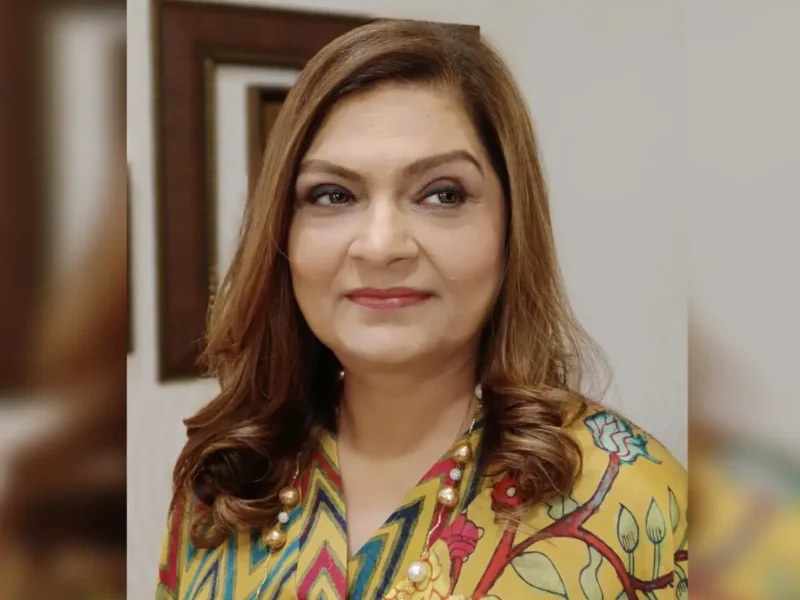
Sivani Of Hidden Compass: Exploration Shouldn’t Be About Conquest But Collaboration
Photo : Sivani Babu is the co-founder and co-CEO of Hidden Compass, a platform dedicated to immersive storytelling and redefining the narrative of exploration. She is seen posing on Deception Island in Antarctica. (Photo: Laurent Dick)
By REENA RATHORE
From running her high-school paper to taking charge of a student-run community newspaper in college to teaching math to public school eighth graders to serving as a federal public defender to embracing journalism, Sivani Babu is enjoying a full-circle moment.
The award-winning Indian American journalist/photographer/editor established Hidden Compass in 2017, a platform dedicated to award-winning immersive storytelling and redefining the narrative of exploration, focusing on stories that transcend borders and celebrate diverse perspectives.
The Santa Barbara based Babu, who teaches law students storytelling for advocacy, reflected on her multifaceted journey and shared insights into how storytelling serves as the cornerstone of her career.
“I look at it as not being as disconnected as it seemed at the time,” Sivani Babu told India-West. “Storytelling is at the crux of everything I have ever done professionally… I believe in the power of storytelling to create a more empathetic world and a more collaborative world and to give us context and connection with people and places and things that are different than we are.”

When she was employed in her dream job as a public defender, the dreaded sequester struck, leaving Babu with an unexpected month of unpaid leave. Undeterred, she seized the opportunity to sail to the majestic landscapes of Antarctica — not her first trip though.
Antarctica, with its icy allure, proved to be more than just a destination; it ignited a creative spark within her. “Antarctica was the place where things shifted. And I feel like I truly became a photographer there,” Babu recalled.
Armed with a newfound passion for storytelling through both words and images, she ventured into the world of journalism after her writing gained traction. Her work has now been exhibited at hundreds of museums and universities across 5 continents.
Babu reminisced about her early fascination with the world, nurtured by her parents who fostered curiosity and a love for exploration. This shared passion for history, maps, and space exploration laid the foundation for her eventual collaboration with business partner, Sabine K. Bergmann.
However, as she matured, she acknowledged a critical realization — the exploration of the past, while inspiring, often carried some baggage of exploitation and colonialism.
Babu explained, “It wasn’t necessarily everything it was cracked up to be,” recognizing the complexities inherent in historical exploration and the growing awareness of the need for a paradigm shift in the approach to exploration. “So there was this kind of reckoning with that past… When we started Hidden Compass, we wanted to understand and acknowledge that we could be inspired by the past but also embrace a new era of exploration.” One in which it doesn’t have to be about conquest, but about collaboration and understanding our place in the world.”
The guiding principles of Hidden Compass, Babu – who earned a degree in law from the University of Pennsylvania Law School and majored in economics, public policy studies, and political science from the University of Chicago – explained, revolved around courage and curiosity.
“We want our stories to inspire those things in our readers and to exemplify those things in the characters that we portray. And that’s not always happy, it’s not always easy, it’s nuanced, it’s complicated, but we want the kind of stories that do that in a real way,” she said. “Too often we hear from quote-unquote experts who are talking about communities and cultures and places that are foreign to them and there certainly is a place for outsiders to tell stories but we want these global conversations to include the most relevant voices and celebrate the voices of people who are the ones living in these cultures and these communities who are experiencing the things firsthand that we’re writing about and reading about.”
Delving into the evolving landscape of journalism, Babu debunked perceptions that long-form content is obsolete in an era of information overload and clickbait headlines. Alongside underscoring that Hidden Compass – which reached 100,000 readers in 2023 – is the “anti-click-bait” company, she emphasized upon the enduring relevance of nuanced storytelling and the importance of honoring readers’ intelligence.
“We are taking on this era of clickbait because we believe it’s unhealthy. We call it junk food media. And there’s a place for junk food, certainly, right? Babu said, “We all indulge in things like that from time to time, and that’s fine, but it shouldn’t be the only thing that’s available. We were frustrated by this perception that people only had a 10-second attention span… We wanted stories that challenged us, that were nuanced, that made us uncomfortable, and there were fewer and fewer places willing to publish those stories.”. And Hidden Compass was born partly out of that frustration, but also out of tremendous hope for the industry…we firmly believe that that pendulum is swinging back as people are paying more attention to what they put in their brains and how it affects them.”
Looking back on her extensive travels, including the five visits to Antarctica, Babu stressed the importance of intellectual and ethical exploration rather than physical frontiers in today’s world, saying “There’s so little we know about even our own planet still but frontiers today can be different…it doesn’t have to be about conquering anything, including nature.”
When an unexpected opportunity arose to photograph polar bears in Svalbard, Babu eventually felt compelled to write about the experience, which led her to question prevailing narratives about climate change and its impact on wildlife populations. She was motivated to contribute something new to the conversation, particularly in response to the viral National Geographic video of an emaciated polar bear. She highlighted the uncertainty surrounding polar bear populations and the distinction between scientific knowledge and emotional reactions to the subject.
“I had an opportunity to photograph a dead polar bear on the beach during this experience and there was sort of the human instinct to want to know what happened coupled with the reality that there are things that we just can’t know and that is uncomfortable for humans. That’s not a feeling we like. We like to think we know things,” Babu told India-West. “There was this opportunity to tell the story that was immersive that took us to Svalbard, but also questioned our knowledge of this subject where people have very strong opinions, but the science is still out. We know that climate change is real. We know that the sea ice is thinning but what we don’t know is what’s actually happening to polar bear populations, right? We can extrapolate that those things aren’t good for them but we don’t know about adaptation and we don’t know about many of the subpopulations of polar bears, there just isn’t data. And so it was the story that made readers uncomfortable… and it was also a story that put us, you know, on the ice with, with the polar bears.”
Ultimately, the piece was widely recognized, including by the Best American Travel Writing.
Babu went on to add that they understand that readers are not necessarily going to visit the places that they read about in a story like theirs.
“What we want to have to happen is for them to see the world a little bit differently, certainly to build connections with places and people that they may never meet because we believe that fosters empathy and understanding. But if we adopt that explorer’s mindset and apply the ideas of empathy, collaboration, curiosity, and courage to our everyday lives, the world could become an incredible place if more people did so. While our readers may not sail to Antarctica or dive the Great Barrier Reef during a coral spawning event, we aim to inspire them to view the world differently, even within their own communities.
Hidden Compass endeavors to humanize journalists and amplify diverse voices from around the world “so that people understand that they’re not robots, that they are coming into the stories they tell with their own experiences, with their own biases, their own perspectives. And the more transparent we can all be about that, I think the better it can be for press, for media, for journalism, and for trust in those institutions at a time when there is so little trust,” Babu noted.
She revealed plans for upcoming projects, including a book exploring the significance of darkness and night through themes of science, ecology, and philosophy, and a storyteller-in-residence program.
In addition to producing compelling narratives, Hidden Compass pioneers initiatives like the $15,000 Pathfinder Prize, which funds modern expeditions embodying the spirit of exploration and inclusivity. Babu highlighted the involvement of readers, or “allies,” in decision-making processes such as selecting grant recipients and shaping editorial content.
Led by international best-selling author and photographer Lola Akinmade, the inaugural expedition to Greenland was a cultural odyssey featuring award-winning storyteller Noo Saro-Wiwa and videographer Erik Jaraker. Inspired by the legacy of explorer Tété-Michel Kpomassie, they explored the narratives of outsiders in foreign lands. Their journey culminated in a captivating documentary, which received critical acclaim at film festivals.
Babu said, “We are trying to foster a world where exploration isn’t just about the stories we tell, but where we can also support exploration that is meaningful, modern, and mindful of how individuals navigate the world.”
Recognizing the pitfalls of ad-driven revenue models, including gathering and selling user data, Hidden Compass sought alternative ways such as patronage campaigns to support their journalists and engage readers.
“A hallmark of our mission,” said Babu, is to recognize that readers aren’t just consumers. “They are partners in publishing with us.”




